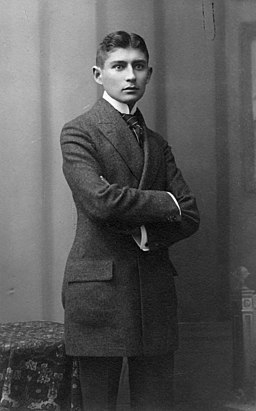I find it fascinating to watch people in the process of creating. I don’t know why this is but I think it has something to do with the fact that I have my own special brand of “getting in the mood” and I’m looking for some sort of validation that I’m normal. More and more lately I suspect that I am not.
I was on the phone with my wife and she was telling me to get some words done while she was out and the kids were asleep. Sage advice from a woman who knows me very well and wants me to finish this damn book. The only problem was that I was exhausted from a week of working the day job and I wasn’t in the mood to write. Plus, with only 13,000 or so words left in the novel I was beginning to realize that an outline would have been a good idea. These were some of my notes for unfinished chapters:
- Insert some stuff about the police in here doing police-type things
- Hint a bit more about extreme nefariousness
- Peter and Dana come across some disturbing shit
This is going to win me Kafka Prize, I can feel it.
 |
| Franz Kafka |
As someone with a history of traumatic brain injuries I can attest to the fact that sometimes the best ideas are the ones that come to you when you’re head is not on straight. Out in the real world they are usually called “bad ideas” and people end up losing their jobs, or their loved one, or their friends; but for creators a bad idea is still salvageable – it’s just going to take a little bit of creativity.
A while back I did a post about giving birth to ideas; a process that in my opinion is significantly less interesting compared with what actually happens when someone starts to work on that idea and begins to flesh it out and bring it to life.
For most people, getting into a creative mindset is nontrivial, and for some finding the Creativity Zone is almost as elusive as finding the G-spot (only the Creativity Zone actually exists). You may be thinking, “But it looks like people do it effortlessly” Well these people are few and far between. They are amazing to watch and invaluable to interact with to be sure, but they are definitely a rare breed. For the rest of us schleps, finding the right frame of mind is a fair amount of work – just like anything else.
 |
| Frame of Mind (I know, I know…) |
Even one of the most creative minds on the planet will tell you that there’s a process to it, that it doesn’t just appear out of thin air like a catapulting cow that’s just been hurled over the wall of a castle. If you have 36 minutes you should watch the John Cleese on Creativity video. It completely changed the way I approach things. If you don’t I’ll sum it up for you:
If you’ve got a nice quiet place to work, about 90 minutes, and access to some like-minded creative people then you’ve got what you need to foster a good amount of creativity.
This brings us to my problem from the second paragraph of this article. Exacerbating it is the fact that there are very few moments in a day where I have all those things at the same time. The best I can do most days is have the kids asleep, a couch to sit on, the Internet on my laptop, and 120 minutes before I go to bed. The other night it turns out that this was close enough.
What I did then, was sit by myself with my manuscript open in one window and YouTube and Facebook in another. My cursor was set to the part of my story that was in need of attention. Then, I watched a good half an hour of Louis CK stand up comedy. This guy is really funny and I find that laughing out loud has a way of relaxing the mind. Then I hit up a friend on Facebook who had a few minutes to spare. We chatted for a bit and just tossed random silly ideas back and forth. The last one I came up with went something like this:
“I think I’ll write a story about a window washer. A transsexual window washer who doesn’t use scaffolding but instead floats down from the roofs of buildings on one of those big Cirque du Soleil velvet ropes, squeegee in hand, washing the windows and winning the hearts of big city Dallas.”
 |
| All he needs is a squeegee |
What?!
I had been reading something about transsexuals recently and my story takes place in Dallas. There was that Cirque person who tragically died a while back during a show, so that was probably in the back of my mind as well. As for the window washing, I can’t explain it. I think I just like the word squeegee.
Squ-ee-g-ee.
SquEEEEE-gEEEEEE.
Once I hit that point I was off to the races and I flipped over to my MS and just started typing. I guess it worked because 24 minutes later I had more than 700 words on the page and was still going strong (anyone who has done NaNoWriMo knows that this is a pretty good clip).
So there you have it. One example of what it took to get from “I’m not in the mood to write” to real life words on a page. I hereby dub it The Squeegee Process™. Is is fascinating? Probably not to most people, but it works for me, multiple concussions and all.
If you have a creative process you’d like to share please comment below. I’d really like to know that I’m not alone.
~ Andrew




























